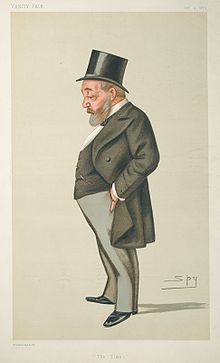Thomas Chenery
Thomas Chenery | |
|---|---|
 Caricature by Spy published in Vanity Fair in 1879 | |
| Born | 1826 |
| Died | 11 February 1884 (aged 57–58) London, England |
| Education | Gonville and Caius College, Cambridge |
| Occupation | Editor of The Times |
| Spouse | None |
Thomas William Chenery (1826 – 11 February 1884) was an English scholar and editor of The Times. His diplomatic background and choice of capable reporters helped to revive the paper's reputation for international news.
Biography
Chenery was born in
After the war, Chenery returned to London, as a
In 1877, John Walker selected Chenery as John Thadeus Delane's successor as editor of The Times. He was then an experienced publicist, particularly well versed in Oriental affairs, and an indefatigable worker with a rapid and comprehensive judgement, although he lacked Delane's sociability and intuition for public opinion.[3] Nonetheless, he introduced a number of innovations, bringing in more writers with scholarly backgrounds to employ their respective expertise. His background as a diplomatic correspondent and his choice of capable reporters for foreign postings revived the paper's reputation for international news coverage.
Despite his position as editor, Chenery was unable to prevent the increasingly partisan slant of the paper imposed by Walter, a member of the Conservative Party. This shift was furthered in 1880 by the appointment of George Earle Buckle, Walter's hand-picked candidate, as assistant editor. Buckle assumed more duties in 1883 as ill health reduced Chenery's ability to play an active role as editor, though he continued in the post until his death on 11 February 1884.
He is buried in Brompton Cemetery.[6]
Notes
- ^ "Thomas Chenery (CHNY849T)". A Cambridge Alumni Database. University of Cambridge.
- ^ Matthew 2004, p. 300.
- ^ a b Chisholm 1911.
- ^ The Assemblies of Al-Ḥarîri. Translated from the Arabic with Notes Historical and Grammatical, trans. by Thomas Chenery and F. Steingass, Oriental Translation Fund, New Series, 3, 2 vols (London: Royal Asiatic Society, 1867–98), [1] (vol. 2).
- ^ Matthew 2004, pp. 300–301.
- ^ Matthew 2004, p. 301.
References
- This article incorporates text from a publication now in the public domain: Chisholm, Hugh, ed. (1911). "Chenery, Thomas". Encyclopædia Britannica. Vol. 6 (11th ed.). Cambridge University Press. p. 77.
- Lane-Poole, Stanley (1887). . In Stephen, Leslie (ed.). Dictionary of National Biography. Vol. 10. London: Smith, Elder & Co.
- Matthew, H. C. G. (2004). "Chenery, Thomas (1826–1884)". doi:10.1093/ref:odnb/5215. (Subscription or UK public library membershiprequired.)
External links
- Works by or about Thomas Chenery at Internet Archive
- Works by Thomas Chenery at LibriVox (public domain audiobooks)

